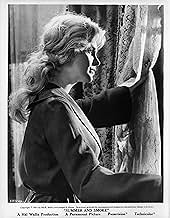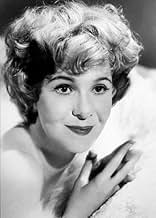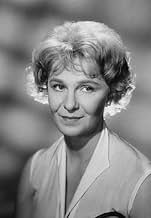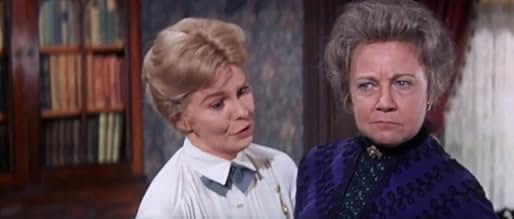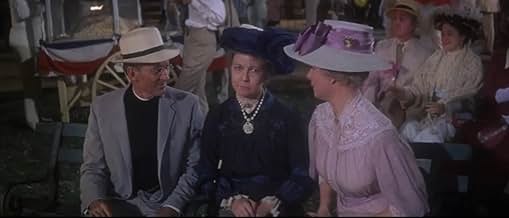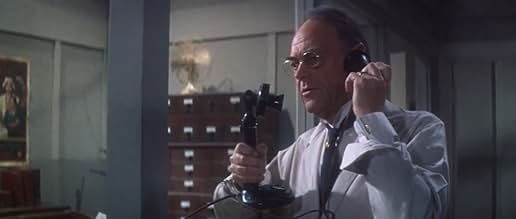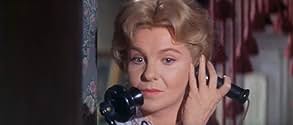AVALIAÇÃO DA IMDb
6,8/10
2,1 mil
SUA AVALIAÇÃO
Adicionar um enredo no seu idiomaA plain, repressed spinster falls for a dashing young medical student who prefers the wilder life, until it's too late.A plain, repressed spinster falls for a dashing young medical student who prefers the wilder life, until it's too late.A plain, repressed spinster falls for a dashing young medical student who prefers the wilder life, until it's too late.
- Indicado a 4 Oscars
- 4 vitórias e 10 indicações no total
Max Showalter
- Roger Doremus
- (as Casey Adams)
Rico Alaniz
- Knife Thrower
- (não creditado)
Cheryl Anderson
- Alma as a Girl
- (não creditado)
Lon Ballantyne
- Orderly
- (não creditado)
John Barton
- Townsman
- (não creditado)
Ray Beltram
- Cantina Patron
- (não creditado)
Marjorie Bennett
- Saleslady
- (não creditado)
Dick Bernie
- Drummer
- (não creditado)
- Direção
- Roteiristas
- Elenco e equipe completos
- Produção, bilheteria e muito mais no IMDbPro
Enredo
Você sabia?
- CuriosidadesHal Wallis Productions bought the film rights to the play in 1952, shortly before its Off-Broadway revival, for $100,000.
- Erros de gravaçãoWhen Nellie Ewell first comes to Alma's house, Nellie's ponytail changes from waist length to mid back length in between shots.
- Citações
John: Eternity? What does it mean?
Alma as a Girl: It's something that goes on and on - when life and death and everything else, is all through with.
John: Aw, there's no such thing.
Alma as a Girl: Oh, but there is. It's what people's souls live in. When they leave their bodies.
- ConexõesFeatured in Cinema: Alguns Cortes - Censura III (2015)
Avaliação em destaque
I wanted to see this film after reading reviews of "Splendor in the Grass", which claimed that the basic idea for that movie was borrowed by William Inge from Tennessee Williams' "Summer and Smoke". I love "Splendor," and wanted to see if the 'Bard of the Midwest' could possibly have copied from his friend's homework.
I think nearly all the films made from Tennessee Williams' plays reveal their stage origins, but none more so than "Summer and Smoke". Sometimes that theatricality works in a film's favour as it does in "A Streetcar Named Desire", but here, it put me off at first. Nonetheless, there are many things I do like about the film.
Set in a small town in Mississippi in the early 1900's, the story centres around Alma Winemiller (Geraldine Page), the daughter of a minister. She is in love with the boy next door, John Buchanan (Laurence Harvey), the son of the local doctor. Repressed emotionally, she believes that personal dignity is the most important thing of all; he on the other hand is adventurous and wild. While she stays at home nursing her mentally ill mother, he goes out into the world experiencing life to the full.
John returns and has affairs with other women, including Rita Marino's Rosa Zacharias in a couple of over-the-top sequences. Alma is crushed, but although both eventually come around to the other's way of thinking, in the end they are just as apart as they were in the beginning.
Although Inge probably saw "Summer and Smoke" when it opened on Broadway in the late 40's, any influence was slight to say the least. As far as the two movies are concerned, "Splendor" is the more accessible work while "Smoke" struggles to overcome its stage roots.
"Summer and Smoke" does picks up the pace along the way, and the two leads are good together. Geraldine Page is an unusually arresting actress, and repeats her role from the stage. She has some tough speeches to deliver, but the vulnerability of her character is painful to watch.
I've always found Laurence Harvey a terrific screen presence, but a number of his peers from British cinema and theatre would disagree - some even thought him a bad actor. Maybe they got his roles on-screen mixed up with his life off-screen. However, there could also have been sour grapes involved; he was very good-looking, had a great voice and the camera loved him; he gives a confident performance in this film.
I knew Elmer Bernstein's score long before I saw the movie. It is a beautiful and nostalgic work with a heart-wrenching main theme. The music gives a haunting sense of loss to the film, offsetting the static sets and overlit photography. It shows the power of music to enhance a film.
"Summer and Smoke" presents some challenging ideas. It's not the best translation of Tennessee Williams to the screen, but more than one scene stays in the memory.
I think nearly all the films made from Tennessee Williams' plays reveal their stage origins, but none more so than "Summer and Smoke". Sometimes that theatricality works in a film's favour as it does in "A Streetcar Named Desire", but here, it put me off at first. Nonetheless, there are many things I do like about the film.
Set in a small town in Mississippi in the early 1900's, the story centres around Alma Winemiller (Geraldine Page), the daughter of a minister. She is in love with the boy next door, John Buchanan (Laurence Harvey), the son of the local doctor. Repressed emotionally, she believes that personal dignity is the most important thing of all; he on the other hand is adventurous and wild. While she stays at home nursing her mentally ill mother, he goes out into the world experiencing life to the full.
John returns and has affairs with other women, including Rita Marino's Rosa Zacharias in a couple of over-the-top sequences. Alma is crushed, but although both eventually come around to the other's way of thinking, in the end they are just as apart as they were in the beginning.
Although Inge probably saw "Summer and Smoke" when it opened on Broadway in the late 40's, any influence was slight to say the least. As far as the two movies are concerned, "Splendor" is the more accessible work while "Smoke" struggles to overcome its stage roots.
"Summer and Smoke" does picks up the pace along the way, and the two leads are good together. Geraldine Page is an unusually arresting actress, and repeats her role from the stage. She has some tough speeches to deliver, but the vulnerability of her character is painful to watch.
I've always found Laurence Harvey a terrific screen presence, but a number of his peers from British cinema and theatre would disagree - some even thought him a bad actor. Maybe they got his roles on-screen mixed up with his life off-screen. However, there could also have been sour grapes involved; he was very good-looking, had a great voice and the camera loved him; he gives a confident performance in this film.
I knew Elmer Bernstein's score long before I saw the movie. It is a beautiful and nostalgic work with a heart-wrenching main theme. The music gives a haunting sense of loss to the film, offsetting the static sets and overlit photography. It shows the power of music to enhance a film.
"Summer and Smoke" presents some challenging ideas. It's not the best translation of Tennessee Williams to the screen, but more than one scene stays in the memory.
- tomsview
- 25 de jan. de 2015
- Link permanente
Principais escolhas
Faça login para avaliar e ver a lista de recomendações personalizadas
- How long is Summer and Smoke?Fornecido pela Alexa
Detalhes
- Data de lançamento
- País de origem
- Idiomas
- Também conhecido como
- Verão de Paixão
- Locações de filme
- Empresa de produção
- Consulte mais créditos da empresa na IMDbPro
- Tempo de duração1 hora 58 minutos
- Proporção
- 2.35 : 1
Contribua para esta página
Sugerir uma alteração ou adicionar conteúdo ausente

Principal brecha
By what name was O Anjo de Pedra (1961) officially released in India in English?
Responda

